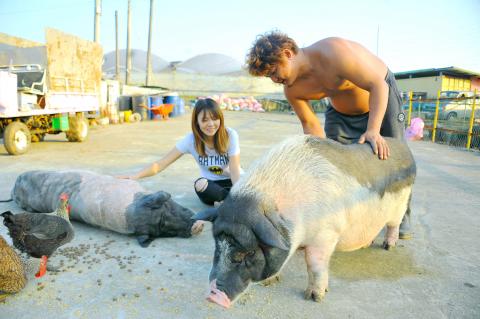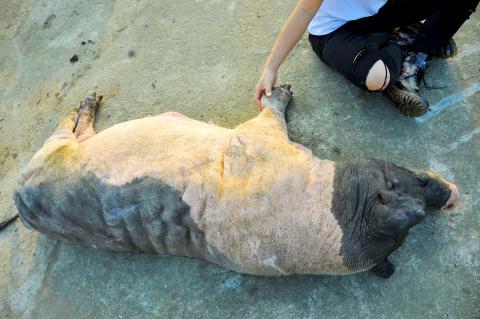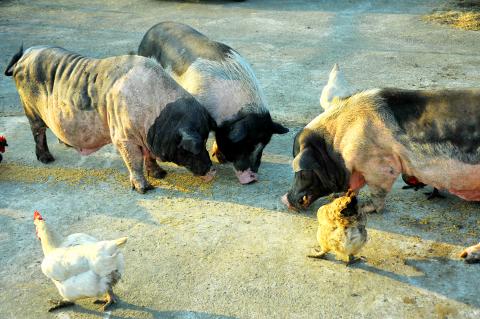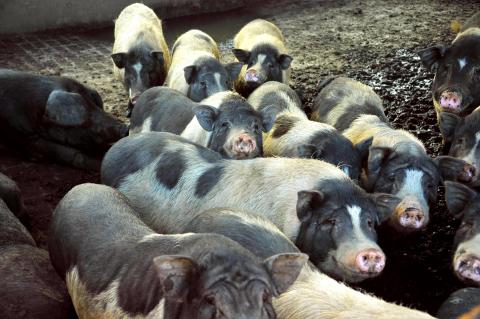On a good night, Lo Hung-hsien (駱鴻賢) used to make up to NT$60,000 by slaughtering over 300 pigs at the Taoyuan City Meat Market. He also raised about 700 animals on his farm to sell to slaughterhouses. He made a lot of money, but he wasn’t happy.
“The animals once saw me as their natural predator,” Lo says. “I needed money. Why else would I raise pigs? But now, I’ve gone from predator to guardian.”
Having been in the business since he was 16 years old, Lo gave up eating meat and abruptly ended his career about 10 years ago. He still owns pigs — 105 of them along with two dairy bulls, a handful of goats, a dog and a number of ducks, chickens and other birds — at his former farm that he’s converted into Pig Heaven (豬豬天堂), an animal sanctuary and petting zoo.

Photo: Han Cheung, Taipei Times
His family has been able to get by through selling vegetarian food and manure, but they’ve been hit recently by the government’s new feeding restrictions in response to the ongoing African swine fever crisis. They either have to switch to food pellets, which is expensive and less nutritious, Lo says, or spend NT$500,000 to bring their kitchen waste processing equipment up to government standards.
“If I can’t raise the funds, I’ll just let the government fine me,” Lo says. “I’m determined to see these animals to their end. What happens in the human world really has nothing to do with them. I’ll take care of it. All they should be doing is living well.”
PUTTING DOWN THE BUTCHER KNIFE

Photo: Han Cheung, Taipei Times
Lo is tossing feed at a herd of Taiwanese black pigs at one of the open-air corrals at Pig Heaven in rural Linkou District (林口), New Taipei City. On the other side, three more common tri-colored hogs are serenly waddling around, sharing food on the ground with several chickens and a dog. These three are the most outgoing “stars” of the farm that visitors interact with: Huei-huei (慧慧), Le-le (樂樂) and Beer (啤酒), who is the oldest resident at 17 years old.
Lo, a tanned 41-year-old with a dyed perm, stud earring and tattoos, trots over with a cigarette in one hand.
“Look, the expression in their eyes are different from pigs who are raised to be slaughtered,” he says. It’s hard for the average person to tell the difference, but Lo is convinced that pigs know their fate.

Photo: Han Cheung, Taipei Times
“They no longer live in fear about whose turn is it to die when the human opens the door to the pen,” he says. “Instead, its ‘daddy or mommy’ giving them food or playing with them. My wife thinks this is very romantic, even though life isn’t always easy.”
Lo says that he used to think nothing about killing pigs, and scoffed at the idea of karma. But he says bad things started happening to his friends who killed pigs at the meat market, such as one who came down with cancer at the age of 27.
He remained unconvinced until a few years later when he and a friend were loading a pig onto a truck bound for the slaughterhouse. Instead of the usual screaming and struggling, this pig just calmly walked out of the pen onto the truck before shooting him a brief glance.

Photo: Han Cheung, Taipei Times
“We were shocked. This is not normal. It was like the pig was telling me that he was my friend. My buddy who was with me is a third-generation pig handler. And he was shocked too,” he says.
Lo says he has not harmed an animal since.
NOT A PIG’S TIME TO GO
Since pigs are commercial commodities in Taiwan, Lo does not actively rescue pigs. Instead, he waits for calls from animal control or highway patrol about stray pigs who have usually jumped off a truck.
Once, he and his wife drove all night to Chiayi and back just to rescue a pig. They also have a uncanny knack for encountering stray animals while driving around.
“Once a duck just appeared in front of the car one day. What happens if we don’t save it? For most of the world’s population, a duck is nothing but food,” Lo says.
His favorite story, however, is when he was driving to pay his electricity bill and a white pig had just jumped off a truck and landed in front of his car. They were just a few hundred meters from the slaughterhouse.
“It was trembling so badly. I jumped out and hid the pig until the truck was out of sight. It was not meant to die,” he says.
The best part about saving animals, Lo says, is that he feels their gratitude.
“They can’t give me gifts, but they show me their appreciation through nuzzling up to me and other warm actions, and they also listen to me when I call them,” he says. “This is more valuable than anything else, along with sharing our experiences and expertise with visitors.”
Luo hopes to figure something out with the feed situation soon. The government only provides subsidies for food pellets, which he says is not good for the pigs in the long run, or incentives for pig farmers to cease their operations. As a sanctuary, that’s not an option.
“We’re stuck in a pretty hard place now,” he says.
For more information, visit www.facebook.com/pages/category/Personal-Blog/豬天堂有機護生農場-140823883307481 (Chinese only).

May 26 to June 1 When the Qing Dynasty first took control over many parts of Taiwan in 1684, it roughly continued the Kingdom of Tungning’s administrative borders (see below), setting up one prefecture and three counties. The actual area of control covered today’s Chiayi, Tainan and Kaohsiung. The administrative center was in Taiwan Prefecture, in today’s Tainan. But as Han settlement expanded and due to rebellions and other international incidents, the administrative units became more complex. By the time Taiwan became a province of the Qing in 1887, there were three prefectures, eleven counties, three subprefectures and one directly-administered prefecture, with

It’s an enormous dome of colorful glass, something between the Sistine Chapel and a Marc Chagall fresco. And yet, it’s just a subway station. Formosa Boulevard is the heart of Kaohsiung’s mass transit system. In metro terms, it’s modest: the only transfer station in a network with just two lines. But it’s a landmark nonetheless: a civic space that serves as much more than a point of transit. On a hot Sunday, the corridors and vast halls are filled with a market selling everything from second-hand clothes to toys and house decorations. It’s just one of the many events the station hosts,

Among Thailand’s Chinese Nationalist Party (KMT) villages, a certain rivalry exists between Arunothai, the largest of these villages, and Mae Salong, which is currently the most prosperous. Historically, the rivalry stems from a split in KMT military factions in the early 1960s, which divided command and opium territories after Chiang Kai-shek (蔣介石) cut off open support in 1961 due to international pressure (see part two, “The KMT opium lords of the Golden Triangle,” on May 20). But today this rivalry manifests as a different kind of split, with Arunothai leading a pro-China faction and Mae Salong staunchly aligned to Taiwan.

Two moves show Taichung Mayor Lu Shiow-yen (盧秀燕) is gunning for Chinese Nationalist Party (KMT) party chair and the 2028 presidential election. Technically, these are not yet “officially” official, but by the rules of Taiwan politics, she is now on the dance floor. Earlier this month Lu confirmed in an interview in Japan’s Nikkei that she was considering running for KMT chair. This is not new news, but according to reports from her camp she previously was still considering the case for and against running. By choosing a respected, international news outlet, she declared it to the world. While the outside world